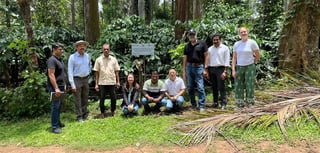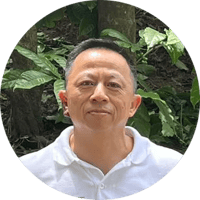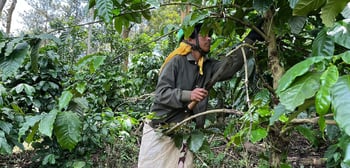Creating a world where people and nature thrive together
At JDE Peet’s, we actively operate in the biodiversity haven of Kodagu in Karnataka state, India. Since October 2020, we’ve been working with local and international impact partners and agricultural experts, implementing programmes aimed at the continuous improvement of farmer livelihoods and the protection of biodiversity.
We spoke to our Sustainability Manager for Asia Pacific, Do Ngoc Sy, about the progress we’re making in Kodagu as part of our broader sustainability programme, Common Grounds.

Kodagu coffee: natural agroforestry systems supporting biodiversity
Tea and India are synonymous: India is the second largest tea producer in the world and a cup of chai is one of the nation’s most beloved beverages. Yet it might come as a surprise that India is also among the top ten global coffee producers, with Karnataka state alone contributing to nearly 70% of the country’s coffee output.
Kodagu continues to be the leading area for coffee production in India, thanks to its naturally favourable growing conditions. This includes shaded growing areas created by the forest canopy and nutrient-rich soil enriched by diverse plant and animal life.
Supporting farmers to revive working landscapes
Through the JDE Peet’s Farmer Programme, we are working to maintain Kodagu’s unique landscape by optimising farming practices and introducing measures to increase biodiversity.
Coffee farmers in production areas commonly resort to using too much fertiliser, agrochemicals and water in attempts to boost their coffee yields. However, these practices have many negative consequences, from decreasing soil nutrients and increasing soil acidity to worsening water scarcity issues, raising carbon emissions and decreasing underground water levels over time.
Partnering with TaTa, Sucden and ECOM, we have initiated a number of projects to address these issues, including training farmers on Good Agricultural Practices and the principles of regenerative agriculture.
As part of this work, farmers have received training on the correct ratios of chemical fertilisers to water to use in coffee growing. By maintaining the ideal balance of fertilisers, farmers in Kodagu can reduce their costs while protecting and improving soil health, which translates to a higher quality crop of coffee.
Meanwhile, intercropping (the practice of growing two or more crops in proximity to one another) significantly reduces reliance on chemical fertilisers in the first place. By intercropping fruit tree saplings with coffee plants, the farmers in Kodagu naturally increase soil fertility, while also diversifying their income.

Partnering with TaTa,
Sucden and ECOM, we’ve
supported the rollout of
field services through
training 11,000
households on Good
Agricultural Practices
(GAP)
“COFFEE FARMING IN INDIA STILL HAS ITS CHALLENGES AND NO ORGANISATION CAN SOLVE THEM ALONE. THAT’S WHY WORKING TOGETHER IN PARTNERSHIP WITH SUPPLIERS AND OTHER STAKEHOLDERS IS SO CRITICAL. I’M PROUD OF THE WORK WE’RE DOING TOGETHER IN KODAGU. WORKING IN SUCH A LARGE AREA ENABLES US TO BRING ON BOARD MANY COFFEE FARMERS AND HAVE A GREATER IMPACT ON THE LANDSCAPE.”
Increasing opportunities for women farmers through accessible education
As many coffee farmers are women, our programme is particularly focused on increasing opportunities for women and girls in Kodagu.
Cultural and social norms surrounding women’s education can deter women farmers from participating in our training. We are currently piloting farmer training programmes exclusively for women across a number of our supplier sites which have been successful in increasing women’s participation in training. Through this pilot and by continuing to engage with families, we hope to enable more women to have access to agricultural knowledge and skills.
Our goal is for women to feel empowered to farm more efficiently, which includes reducing fertiliser costs and increasing profit margins on more sustainably grown coffee. Having identified these women in our supply chain, we’re also able to distribute fruit tree seedlings which offer future opportunities for income diversification.

Restoring canopy coverage to benefit local ecosystems and people
While Kodagu is a heavily forested area, the canopy cover of many coffee farms has rapidly declined in recent years due to increased tree felling and timber production. As a result of canopy and biodiversity decline, human-elephant conflict is on the rise as elephants move into areas inhabited by humans in search of resources.
We’re actively promoting the planting of native tree species to restore the canopy, increase the carbon sequestration abilities of the forest and rejuvenate biodiversity. Over time, replanting the canopy will also help to provide distance between people working in the forest and animals whose habitats have been harmed by loggers. Along with our impact partners, we have designed and implemented farmer and forest officer training and instigated an early warning system to mitigate human-wildlife conflict.
Growing our impact in India
Sourcing coffee responsibly means engaging with farmers and local communities to understand the challenges, and actively addressing them to drive progress.
We’ve learnt so much from this project around the unique challenges and opportunities that come with coffee farming in Kodagu. We’re currently in discussion with our impact partners on how best to implement these learnings across future landscape conservation and community engagement projects in India.





